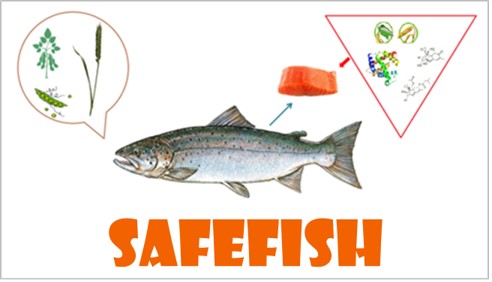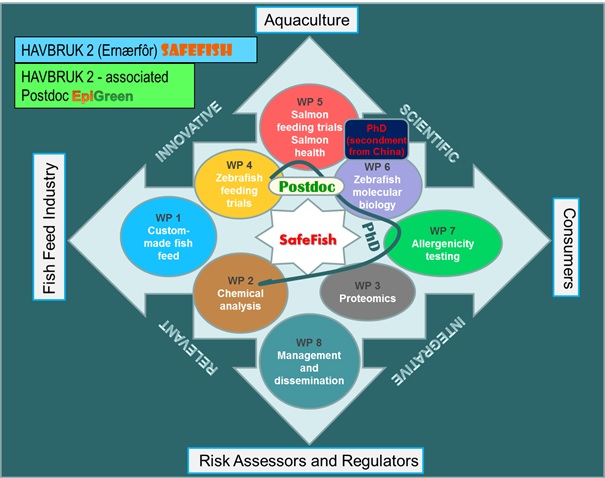The continued growth of Norwegian aquaculture depends on the utilisation of new, sustainable protein resources for fish feed since marine reserves are limited. There has been a transition from marine to agricultural feed materials, which currently make up to 70 % of the aquafeeds used in Norwegian salmon farming. Commonly used are protein preparations derived from wheat and legume plants, mostly soy and pea.

The complete change in the diet of fish has led to new challenges regarding fish health and welfare, and product quality. The overall objective of the SafeFish project was thus to study consequences of a plant-based diet to fish health and to determine the carry-over potential of three typical antinutritional factors (ANF) in plants (mycotoxins, phytoestrogens and allergenic peptides) into fish fillets. Custom-made fish feeds containing defined amounts (15% and 30%) of wheat gluten (WG), soybean protein concentrate (SPC) or pea protein concentrate (PPC) and a control feed containing fish meal (FM) were used in feeding studies in a zebrafish (Danio rerio) model and in on-growing Atlantic salmon (Salmo salar L.). Salmon were exposed to five feed types, i.e. FM, WG15, WG30, SPC15 and SPC30, while zebrafish were additionally exposed to PPC15 and PPC30. Fish muscle and different organs were analysed with a multitude of analytical methods, either for the detection of physiological changes in the fish (transcriptomics, epigenomics, biochemical analyses) or for the tracing of potentially transferred ANF (proteomics, chemical analysis, immunochemical assays including test with food allergic patients), allowing the evaluation of health effects and risks to consumer safety.
The multi-disciplinary project involved the collaboration of two Norwegian institutes as well as two Norwegian universities and a university in the USA, and included the training of one PhD student. A postdoc project (“EpiGreen – Nutrigenomic and nutriepigenomic effect of plant protein-based aquafeeds on fish”, project 267944), was subsequently integrated with the main project.
A quantitative multi-analyte liquid chromatography-high resolution tandem mass spectrometry (LC-HRMS/MS) method for the simultaneous determination of 25 mycotoxins and soybean isoflavones in feed and fish matrices was developed and validated. Sample preparation was optimised for each matrix by selecting suitable extraction solvents. All samples from the fish studies were analysed showing only low levels of the mycotoxin enniatin B in WG-containing diets and of the isoflavones daidzein (DAI), genistein (GEN) and glycitein (GLY) and their respective glucoside forms in SPC- and PPC-based diets. Consequently, carry-over into fish muscle was not observed, confirming that fillets from plant-fed salmon were safe for human consumption.
In vitro assays (liver microsomes and primary hepatocytes) for the biotransformation of contaminants using salmon liver (first reported functional assays) were developed and enzymatically characterised with regard to to Phase I cytochrome P450 (CYP) and Phase II uridine-diphosphate-glucuronosyltransferase (UGT) enzyme activities using specific probe substrates. The method was used to determine products of phytoestrogen metabolism in fish. It was found that salmon can detoxify phytoestrogens by conjugation to certain sugar molecules (glucuronidation), and that therefore human exposure from the consumption of fish products is rather unlikely.
An innovative method for the digestion of gluten proteins with different enzyme was developed and used to prepare samples of gluten-exposed fish for proteomic analyses by mass spectrometry. A label-free LC-HRMS/MS and a multiple reaction-monitoring LC-Triple Quadrupole-MS/MS method with stable isotope-labelled internal standards were developed based on specific gluten peptides as analytes and used to measure samples from WG-fed salmon and control fish, indicating low trace amounts of gluten peptides in fish of the WG30 group. However, the amounts were so low that they do not cause a health risk for consumers of fish products with gluten intolerance or wheat allergy.
Sera of patients with confirmed wheat allergy were applied in immunoblot analyses to detect traces of gluten proteins in exposed fish. The experiments showed that very small amounts of gluten peptides might be transferred into the fish. Additional experiments are currently performed for the verification of these findings, and the results will be published soon.
Potential nutrigenomic effects from plant protein-based diets on fish health were determined using transcriptomic analysis of fast muscle, liver, intestine and spleen.
In salmon, microarray hybridisation analysis was conducted in liver and intestine. Growth performance parameters and apparent digestibilities were recorded, and typical enzyme biomarkers for liver health were analysed in serum. Fast muscle was analysed by specific qPCR, and epigenetic changes in liver by genome-wide analysis of DNA methylation patterns using reduced representation bisulphite sequencing (RRBS). The gene expression profiles in the different salmon tissues showed that several metabolic pathways were the least affected by the SPC15 diet and the most affected by the WG30 diet. The majority of the changes in gene expression patterns occurred in the intestine, in particular in genes related to lipid metabolism and transport, sterol metabolism, immunity and tissue structure and integrity. The observations with regard to WG30 feed implied that the salmon were undergoing nutritional stress and showed symptoms similar to those of gluten sensitivity in humans. Epigenetic changes in the liver were mainly associated with stress markers. In fast muscle, gene expression changes were associated with functions in regulating muscle growth, maintaining muscle structure and function, and muscle tissue homeostasis.
In zebrafish, global gene expression changes were measured in fast muscle, liver and spleen using RNA-seq technology. Changes in the muscle of zebrafish fed with plant diets were moderate, with the highest changes observed for the SPC diets, whereas no changes were found for the PPC diets, when compared to the FM-control group. Similar genes as detected in salmon were affected. With regard to liver and spleen, the WG diets caused the most changes in the transcriptome, especially in stress response- and cellular defence-related pathways. Epigenetic changes were analysed in zebrafish intestine. Methylation changes were mainly observed in genes involved in inflammation and maintenance of intestinal homeostasis.
Summarising the results, the SafeFish project showed that the inclusion of plant-based ingredients into aquafeeds is not of concern for consumers of salmon products regarding potential health risks from the carry-over of mycotoxins, phytoestrogens and gluten peptides, but that a high percentage of WG or SPC in the diet can cause adverse effects in fish.
Conclusion
Taken together, the results of the different experiments showed that under the chosen conditions, using commercially available Norwegian feed ingredients, carry-over of the anti-nutritional factors (ANF) mycotoxins or phytoestrogens from diets containing wheat gluten (WG), soybean protein concentrate (SPC) or pea protein concentrate (PPC) into the fish was not observed. The WG traces in salmon were very small. It could thus be concluded that no risk for consumers of fish products was identified.
However, the study results also showed that depending on the inclusion level of the plant proteins in the diets, a negative impact on fish health could be determined, especially with regard to enteropathological inflammation.
Publications
- PhD-thesis: Johny A. Plant-based aquafeeds: Carry-over potential of mycotoxins and phytoestrogens from feed to fish and implications for fish health and food safety. 4.12.2020, Oslo, Norway.
- Dhanasiri AKS, Johny A, Xue X, Berge GM, Bogevik AS, Rise ML, Fæste CK, Fernandes JMO (2020). Plant-based diets induce transcriptomic changes in muscle of zebrafish and Atlantic salmon. Front Genetics 2020, 11:1288.
- Johny A, Ivanova L, Østbye T-KK, Fæste CK. Biotransformation of soy phytoestrogens in enzymatically characterized liver microsomes and primary hepatocytes of Atlantic salmon. Ecotoxicol Environ Saf 2020, 197: 110611.
- Dhanasiri, A.K.S.; Chen, X.; Dahle, D.; Siriyappagouder, P.; Fæste, C.K.; Fernandes, J.M.O. Dietary inclusion of plant ingredients induces epigenetic changes in the intestine of zebrafish. Epigenetics 2020.
- Johny A, Berge GM, Bogevik AS, Krasnov A, Ruyter B, Fæste CK, Østbye T-KK. Sensitivity to dietary wheat gluten in Atlantic salmon indicated by gene expression changes in liver and intestine. Genes 2020, 11:1339.
- Johny A, Faeste CK, Bogevik AS, Berge GM, Fernandes JMO, Ivanova L. Development and validation of a liquid chromatography high-resolution mass spectrometry method for the simultaneous determination of mycotoxins and phytoestrogens in plant-based fish feed and exposed fish. Toxins 2019, 11, 222–243.
Presentations
- Fæste CK, Johny A, Ivanova L, Dhanasiri A, Østbye T-K, Berge GM, Moen A, Anonsen JH, Bogevik AS, Van Do T, Plassen C, Christians U, Klawitter J, Fernandes J. SafeFish – Hva betyr plantebasert laksefôr for fiskevelferd og mattrygghet? Havbruk 2020, 25.-27.3.2020, Bergen, Norway
- Johny A, Ivanova L, Østbye T-KK, Fæste CK. Phytoestrogens – are they detoxified in salmon? 134th AOAC International Virtual Annual Meeting and Exposition, 8.-24.9.2020, virtual meeting.
- Johny A, Fæste CK, Bogevik AS, Berge GM, Fernandes JMO, Ivanova I (2019). Development and validation of a liquid chromatography high-resolution mass spectrometry method for the simultaneous determination of mycotoxins and phytoestrogens in plant-based fish feed and exposed fish. AOAC Europe – NMKL – NordVal International Symposium 2019 “Speeding towards –omics … Chemical and microbiological food analyses”, 3.-4.6.2019, Oslo, Norway.
- Fæste CK, Johny A, Anonsen JH, Plassen C, Klawitter J, Van Do T, Moen A, Christians U (2019). Can gluten peptides be transferred from feed to fish? 133th AOAC International Annual Meeting and Exposition, 6.-12.9.2019, Denver, USA.
- Dhanasiri AKS, Chen X, Berge GM, Bogevik AS, Fæste CK, Fernandes JMO (2019). Nutriepigenomic effects of wheat gluten-based diet on liver of Atlantic salmon. Aquaculture 2019, 7.-11.3.2019, New Orleans, USA.
- Dhanasiri AKS, Chen X, Dahle D, Siriyappagouder P, Fæste CK, Fernandes JMO. Nutriepigenomic effects of plant protein-based aquafeeds on zebrafish intestine. GIA2018 5th International Symposium on genomics in aquaculture. 21.-23.3.2018, Albufeira, Portugal.
- Dhanasiri AKS, Johny A, Fæste CK, Bogevik AS, Zhang Q, Fernandes JMO. Nutrigenomic effects of plant protein-based aquafeeds on fish muscle and spleen. GIA2018 5th International Symposium on genomics in aquaculture. 21.-23.3.2018, Albufeira, Portugal.
- Dhanasiri AKS, Johny A, Fæste CK, Bogevik AS, Fernandes JMO. Nutrigenomic effects of plant-based aquafeeds on fish muscle and spleen. Havbruk 2018, 18.-20.4.2018, Oslo, Norway
- Johny A, Ivanova L, Fæste CK. In vitro metabolism and phase II biotransformation of isoflavones diadzein, genistein and glycitein in salmon liver microsomes. International Conference on Aquaculture, 4.-6.6.2018, Copenhagen, Denmark.
- Fæste CK, Johny A, Ivanova L. In vitro metabolism of enniatin B1 and deoxynivalenol by salmon liver microsomes. 1st MYCOKEY International Conference, 11.-14.9.2017, Ghent, Belgium.
- Dhanasiri AKS, Johny A, Fæste CK, Bogevik AS, Fernandes JMO. Nutrigenomic effects of plant protein-based aquafeeds on fish. Aquaculture Europe, 16.-20.10.2017, Dubrovnik, Croatia.
Funding: NFR Havbruk2 2016-2020
